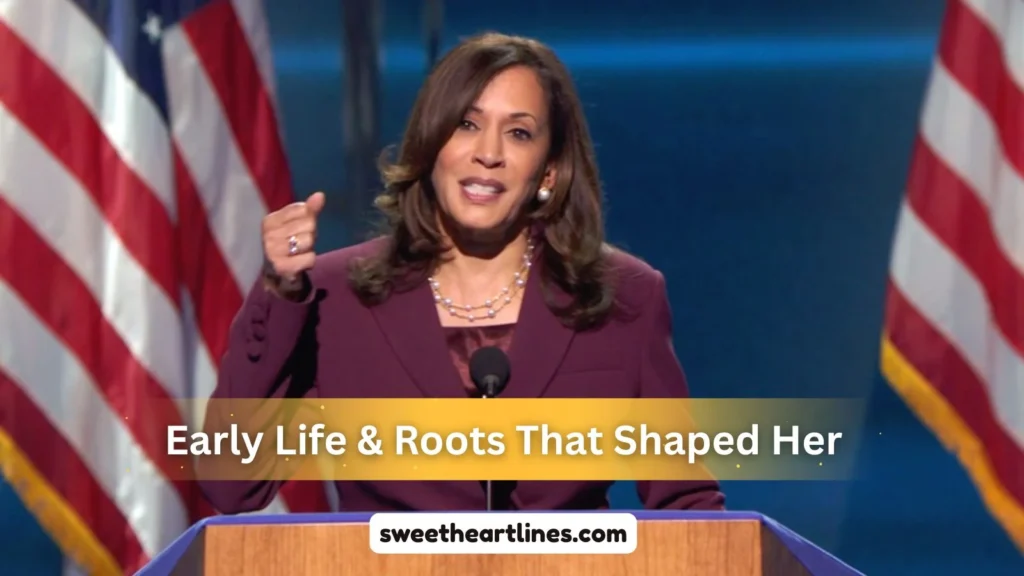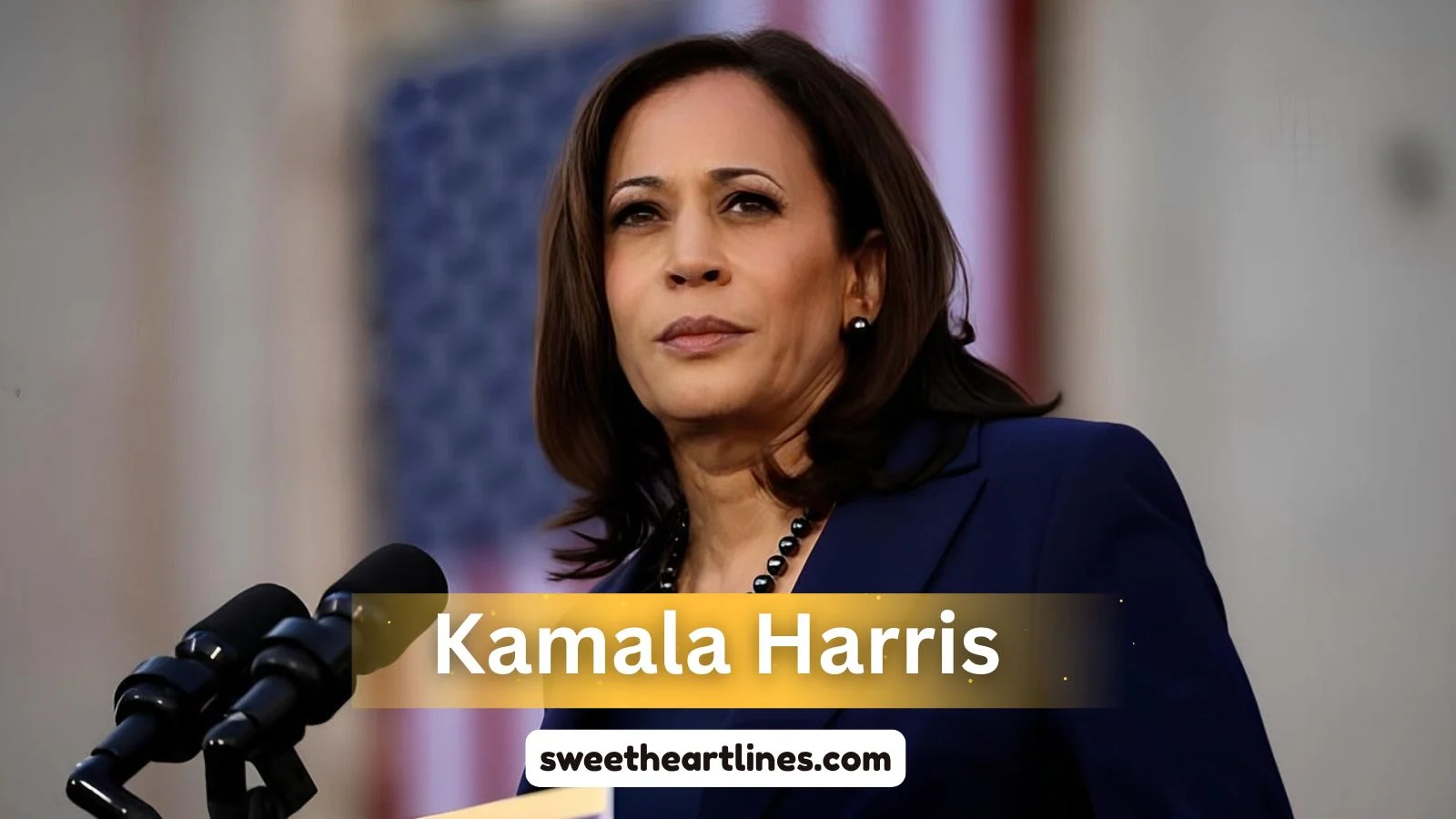Kamala Harris has become one of the most watched political figures in recent U.S. history: trailblazer, frequent target of critique, and always evolving. This article digs deep into the life, achievements, challenges, and the lasting influence she may leave.
Let’s go beyond headlines and explore the “why” behind the hype.
Early Life & Roots That Shaped Her

Growing up in Oakland, California, Kamala Devi Harris was born on October 20, 1964, to a Jamaican father, Donald Harris, and an Indian mother, Shyamala Gopalan.
Her parents were academics and activists—her mother a cancer researcher, her father an economist—who instilled in her early on a strong sense of justice, intellectual curiosity, and a belief in public service.
Some defining features of her childhood:
- Raised by her mother and sister for much of her early years following her parents’ separation.
- Experiences of racial, cultural, and socio-economic diversity: connections with Black, South Asian, immigrant communities. These dual identities (Indian and Jamaican heritage) became part of her public narrative.
- Education that emphasized both intellect and civic responsibility: studied political science and economics at Howard University, then law at UC Hastings.
These foundations matter: they help explain Harris’s priorities later—criminal justice reform, civil rights, immigration, and issues affecting women and minorities.
The Rise Through California Politics
Before Kamala Harris made waves nationally, she was deeply rooted in California’s legal and political systems.
- District Attorney of San Francisco (2004–2011): In that role, she prosecuted criminal cases, with a focus on sexual assault, child abuse, and drug-related offenses. Her office introduced programs to help first-time drug offenders earn high school diplomas and re-enter society.
- Attorney General of California (2011–2017): Became the first woman, and first person of color, to hold that office in California. She tackled large cases involving consumer protection, environmental law, and foreclosure abuses.
Her time in California’s legal system built up her reputation for toughness, pragmatism—but also drew scrutiny over how she handled police misconduct and criminal justice issues. These complexities followed her into her national career.
U.S. Senator & National Profile
In 2016, Harris was elected to the U.S. Senate representing California. She didn’t just take the seat—she used it as a platform. Some defining moments:
- Distinguished herself with aggressive questioning in Senate hearings, often on accountability, national security, civil rights.
- Supported legislation on issues like gun control, immigration reform (including DREAMers), healthcare, environmental protection.
- Became more visible as a Democratic leader, especially as national conversations turned strongly to racial justice, inequality, and climate crisis. Her speeches and writings (such as The Truths We Hold) revealed her views on what she saw as systemic problems needing structural change.
Her Senate years laid out both her strengths—articulate voice, ability to connect across communities—and the stubborn challenges of polarized politics: how hard it is to translate policy ideas into wide-reaching legislation.
Vice Presidency & Major Achievements
Becoming Vice President of the United States (2021-2025) under President Joe Biden was historic:
- She was the first woman, first Black person, and first Asian American to hold that office.
- As Vice President, she led or participated in key national initiatives: expanding voting rights; fighting for climate justice; defending access to abortion; addressing gun violence; advocating for maternal health; dealing with immigration and border crisis; and more.
- In the Senate (as President of the Senate), she broke records for tie-breaking votes. Some of those were moments of deep political importance.
Achievements to note:
- Legislative wins: Key parts of Biden-Harris administration included the Inflation Reduction Act, infrastructure bills, and climate legislation.
- Social justice & civil rights: Pushing for representation (racial and gender diversity) in judicial nominations; defending civil liberties.
Still, the VP role came with constraints. Many critics pointed out that vice presidents, particularly in the U.S., often have symbolic or delegated duties; the balance between influence and responsibility was often under debate in Harris’s case.
2024 Presidential Run & “107 Days”
The 2024 presidential campaign was a defining chapter in Harris’s public journey.
- Initially serving as Vice President under Biden, she became the Democratic Party’s nominee after Joe Biden withdrew from the race.
- Her memoir 107 Days (released September 23, 2025) chronicles that campaign—her reflections, decisions, and the challenges. The title refers to the length of her campaign after Biden stepped aside.
Policy stances during that campaign included:
- Reproductive rights: Strong defense of federal protections post-Dobbs decision.
- Climate justice & environment: Emphasis on environmental equity in vulnerable communities.
- Immigration: She called for reforms both at the border and upstream (aid to Central America, addressing the root causes).
Despite her efforts, her campaign fell short. In 2024 she lost the election to Donald Trump. The campaign raised questions about strategy, messaging, timing, voter connection, and even internal polling vs perception.
Her book 107 Days is widely expected to offer more transparency and context for her decisions—what worked, what didn’t, and what she believes the system needs to do differently.
Controversies, Criticisms & Lessons Learned
No public life is without mistakes, and Harris’s is no exception. These controversies are important to understand her legacy, and what she might do differently moving forward.
- Law enforcement / criminal justice criticisms: Early in her career, there were critiques about how she handled or failed to sufficiently reform police misconduct, mass incarceration, use of prosecutorial discretion, etc. While she argued prosecutorial fairness, critics say she didn’t push hard enough for systemic reform while AG or DA.
- Public perception & communication: At times, her approval ratings and visibility suffered—whether for perceived lack of outcome on big promises, or for how her roles were framed. There were moments when public expectation outpaced tangible progress.
- 2024 campaign timing & strategy: The short timeframe after Biden’s withdrawal, internal campaign dynamics, competition with Trump, polarized electorate—all made her uphill. Her reflections (as teased in her memoir) suggest she believes decisions in that campaign were constrained by many external factors.
Lessons she may carry forward:
- The importance of clear communication and narrative: Making complex policies relatable.
- Balancing symbolism (firsts, heritage, breaking glass ceilings) with delivering measurable outcomes.
- Recognizing the weight of voter trust, especially across diverse demographic groups.
Political Philosophy & Key Policy Positions
To understand what Harris stands for, here are core beliefs and policy priorities—a mix of identity, justice, pragmatism, and systemic change.
- Equality & Representation: Gender equality, racial justice, representation in politics and judiciary. Her identity as Black and South Asian surfaces often in her public rhetoric, both as lens and as tool.
- Reproductive rights: Strong advocate for abortion access, maternal health care. Following the U.S. Supreme Court’s overturning of Roe v. Wade, this became central in her agenda.
- Immigration reform: Not just enforcement but addressing root causes. Balancing border concerns with human rights and international cooperation.
- Climate & Environmental Justice: She emphasizes impact on low-income and minority communities disproportionately affected by pollution, climate disasters. Also supports broader climate policy in the Senate and in executive roles.
- Economic Opportunity & Social Safety Nets: Expansion of healthcare access; supporting small businesses; infrastructure; reducing inequality.
Her political philosophy often threads the needle between progressive ideals and centrist pragmatism—sometimes satisfying both camps, sometimes satisfying neither fully, depending on context and expectations.
Global Influence & Legacy So Far
Even though Harris lost in 2024, her influence remains substantial:
- She broke multiple barriers: gender, race, ethnicity. These symbolic achievements are powerful for representation and aspirational politics.
- Her memoir 107 Days gives an inside look at how modern campaigns work, what pressures exist, and what limits even high-office holders face. This contributes to the public’s understanding of political systems—transparency matters.
- She remains a polarizing figure—but in many ways, that means relevance. She is frequently part of national conversations about democracy, justice, rights, and the tensions between idealism and realism.
What her legacy might lean toward:
- Inspiring future leaders: Especially women, immigrants, people of color.
- Shaping policy norms: On reproductive rights, environment, criminal justice.
- Perhaps influencing how vice presidents are viewed—not just ceremonial, but agents of policy and communication.
What’s Next
As of late 2025, some things to watch:
- Her book tour for 107 Days is likely to spark conversations, reflections, possibly set up her voice in future political roles.
- Whether she returns to active politics (running again for national office, state office, or a leadership role within the party) or focuses on advocacy, speaking, writing.
- How her critiques of the 2024 election, and of political systems, are received—and whether they lead to reforms.
Frequently Asked Questions
What is 107 Days about?
It’s her political memoir detailing the 2024 presidential campaign that followed Joe Biden’s withdrawal from the race. It highlights lessons learned, behind-the-scenes decisions, and reflections on the political landscape.
What are Kamala Harris’s background and early influences?
Born in Oakland to immigrant parents, she grew up with exposure to activism, racial and cultural diversity, and a strong emphasis on justice and public service. Her education and early legal work in California shaped much of her career trajectory.
What were Harris’s major policy focuses as Vice President?
Voting rights, civil rights, reproductive health, climate justice, immigration reform, infrastructure investment, healthcare access.
Why did she lose the 2024 election?
Multiple factors: the timing of her nomination after Biden’s withdrawal, polarized electorate, messaging challenges, how voters perceived her performance as VP; also structural challenges within the campaign itself.
How does Kamala Harris’s heritage affect her politics?
Her Jamaican and Indian roots, coupled with her upbringing in diverse California communities, give her a multi-cultural lens. They inform her emphasis on representation, intersectionality, and empathy toward immigrant and minority communities.
Conclusion
Kamala Harris’s journey is one of firsts, challenges, progress, and complexity. From her roots in California, shaped by immigrant parents and early encounters with inequality, to ambitious stints as Attorney General, U.S. Senator, Vice President, and a presidential candidate—her path is far from linear.
Her strengths lie in resilience, breaking barriers, speaking up for marginalized communities, and pushing forward policy ideas many consider essential. But her story also shows how political life demands trade-offs: between symbolism and substance; between expectations and what’s possible; between ideals and compromise.
As 107 Days begins to enter public conversation, what people should watch for is not just what she promises, but how she frames what she couldn’t accomplish—and what she believes must change. Her legacy isn’t settled yet. Whether future chapters in her career lean toward another office, advocacy, or mentorship, the impact of her life so far is already felt deeply across American politics.












